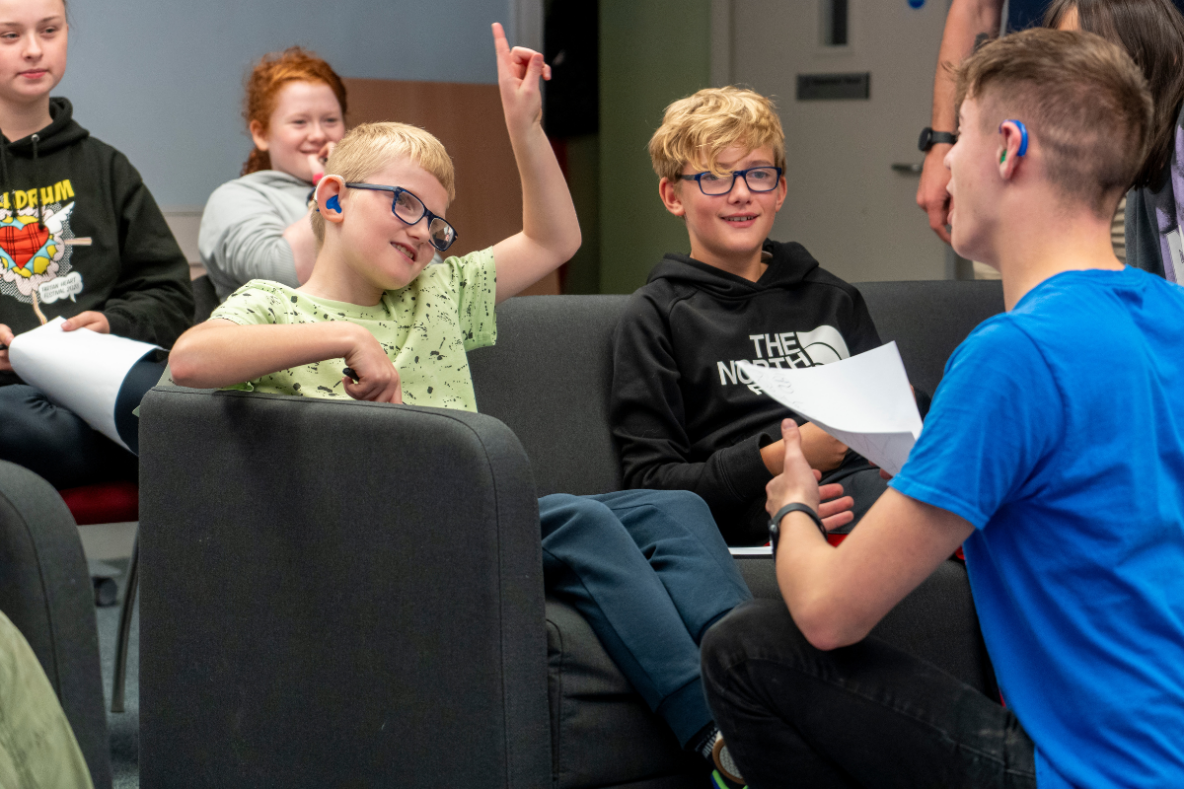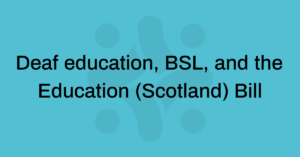Ongoing challenges in deaf education
Recently I appeared on the See Hear programme, discussing deaf education and deaf parenting with both deaf and hearing parents. It struck me that even though the deaf community has had the same issues for years, nevertheless they persist. I believe this is due to a lack of recognition of British Sign Language and deaf culture, and the pervasiveness of the medical model of deafness as well as a lack of deaf awareness and the importance of language acquisition.
Despite huge strides towards the legal and social recognition of BSL with the British Sign Language (BSL) Act Scotland (2015) and the creation of a National Plan with the ambition of making Scotland the best place in the world for deaf people to live, work and visit (and learn), a recent CRIDE report showed ongoing issues in deaf education. There is a shortage of Teachers for the Deaf, a lack of support staff with adequate BSL skills, and persistent overall lower academic achievement for deaf students.
Education (Scotland) Bill: a missed opportunity for BSL
At the time of writing, the Scottish Government is proposing a new Education (Scotland) Bill which puts forward two new bodies, Qualifications Scotland and an inspectorate agency. This is a welcomed proposal for a new national educational framework that would incorporate elements of the education and skills system that work together as one single system with a collective responsibility to improve outcomes and experiences for pupils and students in every setting in Scotland. Pertinently, this proposed bill lays out in detail that both the Qualifications Scotland and Inspectorate Agency “must have specific regard to the needs and interests of those who are receiving or wish to receive Gaelic Learner education or Gaelic medium Education”. Unfortunately, the bill gave no mention whatsoever to our esteemed language, BSL.
As we approach the ten year anniversary for the BSL (Scotland) Act 2015, how is it that Scotland, the first country in the world to ratify a BSL Act with that all-important ambition of being the best place for deaf people to live, work, visit and learn, has put forward an Education Bill with near perfect consideration for Gaelic yet not for BSL?
Gaelic is an indigenous language of Scotland that has similar legal and demographic status (the most recent census found that BSL is used by 2.2% of the population which is strikingly similar to the 2.5% that uses Gaelic). Yet somehow BSL has still not been included. This shows how BSL is still an afterthought even now, and even with all the research, lessons and experiences of parents with deaf children, we still battle for equity of access.
Why BSL access is critical for deaf children
As both a father of two deaf children, now adults, and a CEO with nearly three decades of experience managing charities for the deaf, I know the importance of the provision of BSL in education. BSL is my native language as it is for my two deaf children who had the privilege of this crucial acquisition of language from birth. This helped pave the way for full educational attainment in their academic journey. This would not have been possible without the BSL access they had throughout their education. In my work as a CEO, I have seen firsthand the impact of lack of adequate BSL access on the lives of deaf people, from mental well-being, employment, social inclusion, and educational attainment. Language comes first. No matter what modality it is whether signed or spoken. But deaf children and their parents need access to BSL for it to even be a viable option.
Including BSL in the Education Bill has huge implications for deaf education. For example, deaf young people would be able to take vital exams and assessments in the language they are most comfortable using, increasing the likelihood of higher academic attainment. This is what Qualifications Scotland can do for deaf young people in Scotland. Right now, there are deaf young people struggling through their exams to put pen to paper in written English about concepts they understand perfectly well in BSL and ultimately it is their relationship with English that is assessed, not their true ability.
What’s next for deaf education in Scotland?
Deaf Action with the support from our partners, RNID, Deafblind Scotland, The Health and Social Care Alliance Scotland, Lothian Children’s Deaf Club and the National Deaf Children’s Society (NDCS) recognizes the importance of the inclusion of BSL into the Education (Scotland) Bill. We sent a response to Scottish Parliament urging them to reconsider their position and to include BSL in this all-important Education Bill. I am delighted to report that the committee has since reconsidered their position and agrees that “BSL should have parity of esteem with Gaelic throughout the Bill and recommends that the Bill is amended to place specific requirements on Qualifications Scotland and HM Chief Inspector of Education to take account of the needs and interests of those who use BSL, or wish to do so.”
This success is welcomed by all stakeholders in Scotland, and we look forward to working together to further the status of BSL in Scottish education. However, we must ensure that this initial oversight is not repeated and that BSL continues to be considered, not merely an afterthought. Deaf children should be equal to their peers regardless of the language they use. Only with true equality and equity of access that we can see finally change for the better.
Discover other CEO blog posts here.



